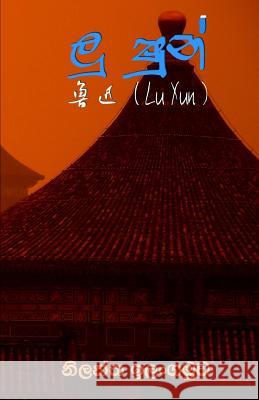Lu Xun » książka
Lu Xun
ISBN-13: 9781536990140 / Sinhala; Sinhalese / Miękka / 2016 / 202 str.
Lu Xun, one of the pseudonyms used in his creative writings by Zhou Shuren, is commonly known as the father of Modern Chinese literature; the man behind the social reforms and one of most important and influential writer in political changes in China, right after she faced the first democratic revolution in 1911. Born in a feudal society which was experiencing collapse & instability and was surrounded by imperialists, Lu Xun's story is much larger than his life. Having had his primary education under the guidance of the most genuine teacher in the village, Lu Xun earns the opportunity of exploring into the nuances of the local society in addition to relating to the situations in neighbouring countries. First, as a medical student, then as the man of letters, Lu Xun strikes against hypocrites and their mimics' world of deception. He refused the jargon which to him was nothing more than killing time but instead, spent his whole life with fact and figures. First in fiction and then in non-fiction Lu Xun, published hundreds of thousands of Chinese characters to change the blindfolded and melancholic nation. He rang the bell to awaken the people in general, to fight for their causes. He walked the footpath of freedom despite encountering enormous challenges, on the way. Known friends turned into the unknown, cunning and teasing enemies, who would then attempt to lower the spirit of Lu Xun while playing dirty politics behind the scenes. But Lu Xun was certain about what was needed to be done. True, there is some negative criticism about Lu Xun, especially about him being the key member of the May Fourth Movement - the initiative that developed against the old culture - while standing beside of revolutionary guards, the best political alternative at that time. However, there is empirical evidence that confirms that the works of Lu Xun had the effect of motivating society beyond Lu Xun's expectations. Works of Lu Xun also encountered challenges similar to like what happened to the works of Nietzsche, during the administration led by Adolf Hitler. In fact, many referred to Lu Xun as the "Chinese Nietzsche." Slowly but surely growing debate on Lu Xun is spreading across the Globe and many academics, writers and social activists have started reading his characters with interest - thanks to the dedicated people who have offered the world Lu Xun's works in many languages. This year the world is going to commemorate the 80th death anniversary of Lu Xun, and it is indeed the fruitful manifestation of strong motivation and enthusiasm of many writers who started critically researching and analysing what Lu Xun tried to achieve in his life and what his expectations for a just society, were. This book is an attempt to explore the life and works of Lu Xun to be presented to the readers in Sri Lanka whose mother tongue is Sinhala. Some of the most discussed works of Lu Xun and his writings on a revolutionary society that was booming at one time only to face its most difficult time in encountering, challenging and exposing the hypocrites, have been translated in this book. In addition to his works, comments about his works also have been included in some chapters.
Zawartość książki może nie spełniać oczekiwań – reklamacje nie obejmują treści, która mogła nie być redakcyjnie ani merytorycznie opracowana.











